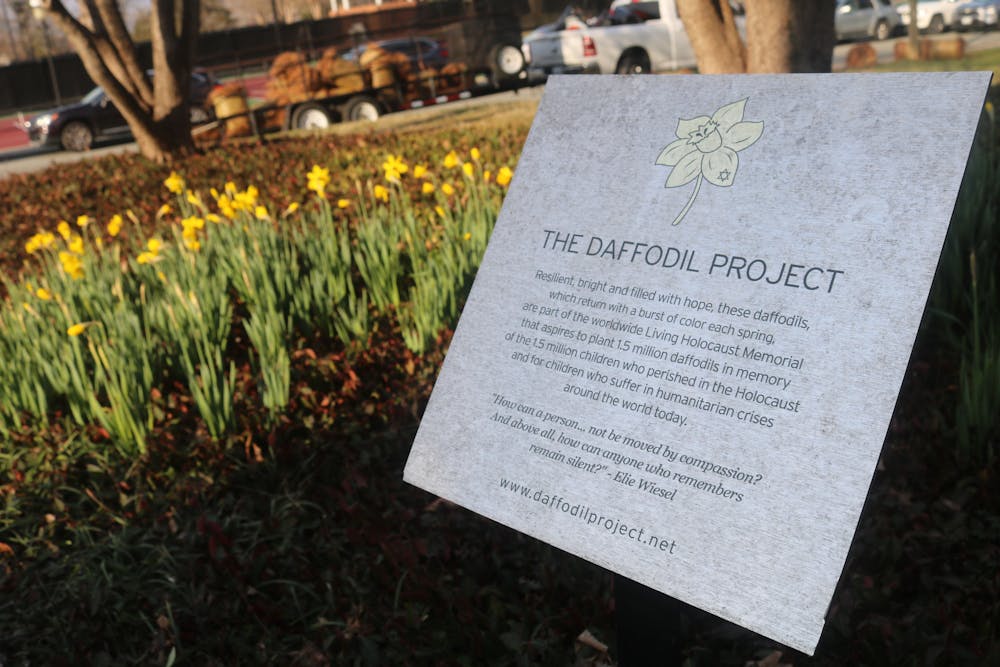Updated as of 12:45 p.m. on March 10 to update the Daffodil Project's mission statement.
Within the next five to 10 years, Jewish educator Boaz Avraham-Katz said there will be no Holocaust survivors left alive. Claims Conference, a nonprofit organization dedicated to securing material compensation for Holocaust survivors, said 95% of Holocaust survivors are child survivors — meaning they were children when World War II ended in 1945. Survivors such as 98-year-old Margot Lobree, who visited Elon in February, were able to share their stories of surviving genocide as a child; however, 1.5 million children were not.
The Daffodil project is an initiative from Am Yisrael Chai, a nonprofit Holocaust and genocide education and awareness organization. With over 900,000 planted, its mission is to plant 1.5 million daffodils across the globe to honor the 1.5 million children who died in the Holocaust —as well as to support children suffering in humanitarian crises around the world, according to the founder of the Daffodil Project Andrea Videlefsy.
“I was finding, looking for a way to bring Holocaust education — to make it relevant in terms of understanding the message of the Holocaust — and bringing it to today’s world,” Videlefsy said.
The project began in 2010, but the conception of the idea formed in 2008. Elon joined the project as a partner in 2013 and as of 2024 has planted approximately 30,000 bulbs across campus, making Elon its biggest contributor compared to any other university in the country.
Interactive map courtesy of the Daffodil Project.
Elon University’s Botanical Garden Coordinator Hanna Smith said it has been a continuous, combined effort between university landscaping and Hillel at Elon. Smith started the position this January, but she has had the opportunity to spearhead this year’s daffodil plantings.
Videlefsy said daffodils are the flower of choice due to the color and shape, which are reminiscent of the yellow Star of David that Jewish people had to wear during the Holocaust.
“It’s the shape and the color being like the yellow stars, but also it’s the symbolism of resilience,” Videlefsy said. “The daffodils are planted in the fall, then they come up and they bloom for a very short period of time, which is just like the lives of the children.”
According to Videlesfy, there are 565 Daffodil Project locations worldwide with 12 project ambassadors who are responsible for recruiting more partners.
“We try to make things as easy as possible for sites to participate, mostly people order their daffodils through us. Elon has since the very beginning,” Videlefsy said.
Videlefsy said partners have the obligation of planting a total of 500 bulbs, but the project will provide the first 250. They also offer silk daffodils for areas where regular daffodils struggle to grow, as well as a mini-plaque that people can plant in their yards.
“We are very appreciative of the efforts that have gone into the daffodil memorial there at Elon University,” Videlefsy said.
Smith said Elon requests around 2,000 daffodils every year to be planted across Elon’s campus, in places such as Carolina and Carlton. In addition, Smith said if a plant has died on campus grounds, they replace it with a daffodil and try to fill in as many spots as possible.
Avraham-Katz said not many people on campus are even aware of the daffodils’ meaning.
“I think a lot of people don’t know why this is here,” Avraham-Katz said.
Avraham-Katz said it is important to have initiatives that help preserve the memory of the Holocaust, such as the Daffodil project, but also Holocaust speakers who share their experience such as Lobree.
“There’s a difference between seeing it on film,” Avraham-Katz said. “And actually being with somebody that experienced it.”
Freshman Miri Pottebaum said she hopes students will see this as a learning experience. Pottebuam said she went to a Jewish school where she learned about the Holocaust, but she knows it can be a difficult topic to be taught in some spaces.
“I think it’s a good reminder of taking opportunities and living life to the fullest,” Pottebaum said.
Avraham-Katz said he hopes students on campus remember that these daffodils mean more than just a flower.
“They bloom to remind us how beautiful those children were,” Avraham-Katz said. “They perished and died for no reason.”


